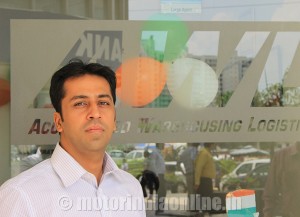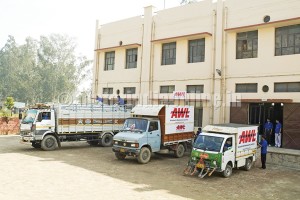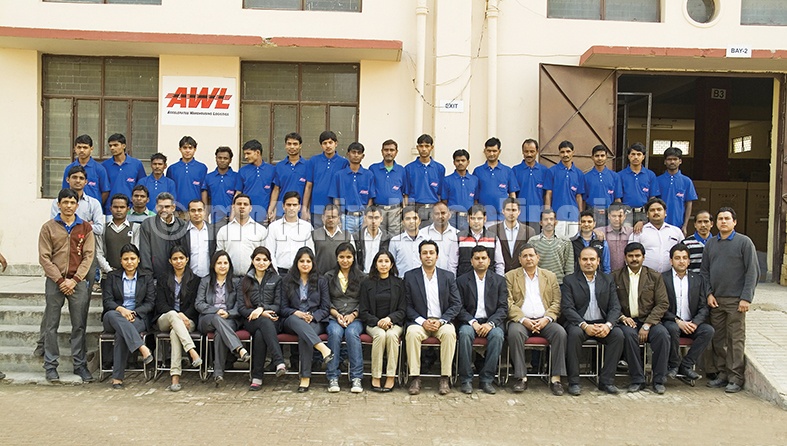Accelerated Warehousing Logistics Pvt. Ltd. (AWL), a prominent supply chain management solutions provider, is chalking out robust strategies to enhance its presence in its contract logistics business division comprising warehousing facilities, distribution solutions, temperature-controlled trucking and road transportation management. The home-grown logistics giant, which also offers air & ocean freight forwarding, container freight station, taxation and permits, etc., is looking to tap the burgeoning inland logistics industry. Out of its total turnover, the contract logistics arm contributes roughly 35 per cent which will be scaled up to 60 per cent by 2020. The eight-year-old firm has been one of the most successful start-ups in the logistics industry and is hoping to achieve a four-digit turnover by the next decade.

Mr. Rahul Mehra, CEO and Founder of AWL, in an exclusive interaction with Motorindia, shared: “The company believes in the principle of providing personalized services to its customers and making use of its vast experience in the logistics industry. We obsess over customers, not competitors. For every decision we ask ourselves: what’s in it for customers, and will this delight them? We are truly committed to reshape the current landscape of the supply chain industry in India. More than executing routine projects like exporting and importing of goods (done by freight forwarding companies); we are keen to boost our presence in the inland logistics space. Floater Model & Last Mile connectivity are a few USPs among many that differentiate AWL from others. Furthermore, I am personally maintaining a key focus on warehousing and distribution verticals with an aim to take AWL into an elite league of supply chain integrators. This segment of the logistics industry is growing by 10-15 per cent on an annual basis as a lot of multinational firms are increasingly outsourcing their logistics and warehousing functions.”
Jaquar, Red Bull, and Callaway are some of the marquee clients AWL has allied with for its custom-based solutions.
Founded in 2007, AWL is one of the leaders in the Indian logistics industry holding over 500,000 sq.ft of warehousing space connecting and successfully distributing to multiple clients in over 200 cities in India. The Gurgaon-based firm has its presence in various industry verticals like Retail, Lifestyle, FMCG, Consumer Electronics, Infrastructure, Telecom, etc., and will also be eventually getting into e-commerce and automotive industry verticals.
Present in all major locations and gateways across India, AWL has an extended network of agencies worldwide and over 65 network agents in major markets throughout Asia, Europe and the US. The company’s overseas partners continue to carry the tradition of service and flexibility to its customers in over 100 countries.
Elaborating on its expansion plans, Mr. Mehra noted: “As there is a major uptrend in the market, we are drawing up plans to double our warehouse footprint to 1 million sq.ft and expand into tier-II and tier-III cities. We are already present in major metro cities like Delhi, Mumbai, Calcutta, Chennai, Ahmedabad, Jaipur and Lucknow and are looking to set up our base at Vijayawada, Hyderabad, Indore and Nagpur. Concurrently, we will also be expanding our dedicated fleet size. Having said that, all eyes are on the GST which we hope will get implemented by the Government by 2016.”
When asked to shed some light on its fleet of vehicles, Mr. Mehra said: “Although we don’t own our own trucks, we have a network of sub-contractors who provide us with the required fleet. But we are looking at the option of leasing it with the automakers in case they launch something lucrative.There are 3,500 vehicles in our fleet which we have taken on a lease basis. We have a mix of small and bigger vehicles, but the key focus is last-mile connectivity.
He added: “Although we have tied up with multiple fleet operators, we have basic processes that are customized in terms of audit requirements and checks that we do for our fitness certificates. We have 26-hour mandatory training for them which is linked to their incentives, appraisals, etc. The last-mile vehicles are usually run on green fuel or operated on Euro Level norms.We do use MCVs & HCVs but on a contractual basis for our inter-warehouse stock transfers. Some of the brands we use are Tata Ace, Mahindra Maximo, Ashok Leyland Dost, etc. All these vehicles, run on green fuel and customised as per our requirements. We are also using temperature-controlled trucking as a lot of perishable products like beverages require such solutions. In order to maintain standards and provide services to our customers, we have created cold rooms (in our trucks).”
Mr. Mehra also expressed his delight that decade-old diesel vehicles have been taken off the Delhi roads even though it might give teething troubles in its systems integration. “I am really happy that the ban on decade-old commercial vehicles will make the eco-system further greener. I personally think that it will give a major boost to the companies like us involved in last-mile delivery as majority of the fleet is small and healthy. A number of countries like Brazil, China, Denmark, etc., have prohibited diesel vehicles or are in the process of doing away with them and imposing stringent taxes on such vehicles. We have already noticed that certain stringent measures need to be taken to ensure that the residents of Delhi do not travel closer to ill-health with each breath they take.”
When asked to shed some light on some of the key growth levers, Mr. Mehra remarked, “The new government at the centre is likely to give a massive thrust to the infrastructure sectors like road, power, highways, etc. A region’s industrial and employment base is closely tied to the quality of the transportation system. Good, dependable transportation infrastructure allows businesses to receive inputs to production facilities and to transport finished goods to market in an efficient manner. An efficient transportation system allows companies to lower transportation costs,which lowers production costs and enhances productivity and profits.”
When talking about the challenges which might impede its growth prospects he maintained: “Uniform tax structure, skilled workforce, shoddy infrastructure, stalled economic reforms, etc., are some of the crippling issues that should be resolved at the earliest.”
Quizzed to spell out the vision for the company, Mr. Mehra concluded saying: “AWL aspires to be one of India’s leading supply chain management companies by 2020. We are committed to re-shape the current landscape of several supply chain activities in India through our dedication and hard work, backed by modern technology and aggressive leadership.”

